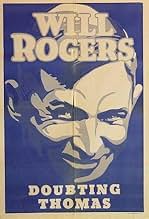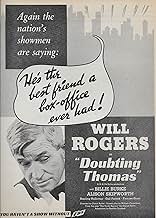Añade un argumento en tu idiomaA husband makes fun of his wife's theatrical aspirations when she agrees to appear in a local production. When she begins to neglect him, he decides to retaliate by also going on stage.A husband makes fun of his wife's theatrical aspirations when she agrees to appear in a local production. When she begins to neglect him, he decides to retaliate by also going on stage.A husband makes fun of his wife's theatrical aspirations when she agrees to appear in a local production. When she begins to neglect him, he decides to retaliate by also going on stage.
Lynn Bari
- Aspiring Actress
- (sin acreditar)
Argumento
¿Sabías que...?
- Citas
Thomas Brown: I feel like an old lion being thrown to the Christians.
- ConexionesReferenced in Expediente X: Three Words (2001)
- Banda sonoraWhere the Blue of the Night (Meets the Gold of the Day)
(uncredited)
Music by Fred E. Ahlert
Lyrics by Roy Turk
Sung by Will Rogers
Reseña destacada
This pleasant comedy was adapted from a play by George Kelly called "The Torch Bearers," which ran on Broadway for several months in 1922. Kelly's play poked fun at community theater, or more specifically at the pretensions and self-delusions of people who participate in it and manage to convince themselves that they're far more gifted than they actually are. Adapted for the movies as Doubting Thomas, the material was nicely suited for the special talents of Will Rogers, cast as a businessman named Thomas Brown who is exasperated by his wife's (and his community's) infatuation with play-acting. He eventually contrives a scheme to cure his wife of the theatrical fever once and for all.
It's ironic that a movie poking fun at bad acting features so many first-rate character actors. For the most part, the comedies Rogers made at Fox in the '30s were star vehicles built entirely around his persona, but Doubting Thomas is more of an ensemble piece that gives some of the best moments to an array of colorful personalities in supporting roles. Billie Burke, with her inimitable trilling voice, is perfectly cast as Rogers' dotty wife and gives the funniest "bad" performance in the show-within-a-show. Film buffs will enjoy spotting other familiar faces in the cast: Johnny Arthur, Gail Patrick, T. Roy Barnes, John Qualen, and the possessor of another famous voice, Sterling Holloway, as a nerdy backstage assistant. Best of all, the magnificent Alison Skipworth is in her element as Mrs. Pampinelli, the self-dramatizing director of the amateur show. Skipworth was the only member of the original Broadway cast who repeated her role in this film, and she seizes the opportunity to dominate every scene she's in. Mrs. Pampinelli is an embodiment of the personality type who would today be known as a Diva or a Drama Queen, and Skipworth, who made her London stage debut in the 1890s, was precisely the sort of battle-hardened stage veteran the part demanded.
There are times during this film when the nominal star Will Rogers is almost lost in the shuffle, but he can generally be found off to one side making wry comments about the other players' antics. Rogers' funniest routine comes towards the end, when he turns a bogus screen test into an opportunity to parody crooner Bing Crosby. It's the comic highpoint, but otherwise Rogers is faithful to George Kelly's text -- uncharacteristically so, for a star who usually rewrote his lines. If almost anyone else had been cast as Thomas Brown (for instance, Rogers' friend W.C. Fields) the guy would most likely have come off as sour and selfish, what with his constant complaining that his wife's play- acting mania is keeping her from tending to his needs at home, but Rogers's considerable charisma smooths his character's rough edges. Bearing in mind the age of the source material, we have to accept the attitudes expressed by the playwright as reflecting those of his era; in fact, when this 13 year-old play was filmed in 1935 some critics were already calling it old-fashioned! In one respect the attitude of the male characters seems decidedly misplaced: Thomas Brown's son Jimmy (played by Frank Albertson) echoes his father's irritation over his girlfriend Peggy's ambition to appear in movies, and bluntly tells her she has no talent. But when we see Peggy's screen test it's undeniable that she's a terrific dancer, so good that Jimmy's determination to keep her from going to Hollywood feels short-sighted and sexist. (Peggy is played by an obscure starlet named Frances Grant, who was certainly skilled at dancing but not much of an actress.) It would have made more sense, dramatically speaking, if Peggy had been just as inept a performer as the community theater players.
At any rate, Doubting Thomas is a lightweight, engaging, dated, but generally enjoyable comedy, pleasant and seemingly lacking any ambition to be a laugh riot. It maintains a medium tempo and never accelerates, but it's carried by the considerable talent of a unique leading man surrounded by a first-rate ensemble. Will Rogers fans will certainly want to see it, but you may find that it's Alison Skipworth who makes the strongest impression in the end.
It's ironic that a movie poking fun at bad acting features so many first-rate character actors. For the most part, the comedies Rogers made at Fox in the '30s were star vehicles built entirely around his persona, but Doubting Thomas is more of an ensemble piece that gives some of the best moments to an array of colorful personalities in supporting roles. Billie Burke, with her inimitable trilling voice, is perfectly cast as Rogers' dotty wife and gives the funniest "bad" performance in the show-within-a-show. Film buffs will enjoy spotting other familiar faces in the cast: Johnny Arthur, Gail Patrick, T. Roy Barnes, John Qualen, and the possessor of another famous voice, Sterling Holloway, as a nerdy backstage assistant. Best of all, the magnificent Alison Skipworth is in her element as Mrs. Pampinelli, the self-dramatizing director of the amateur show. Skipworth was the only member of the original Broadway cast who repeated her role in this film, and she seizes the opportunity to dominate every scene she's in. Mrs. Pampinelli is an embodiment of the personality type who would today be known as a Diva or a Drama Queen, and Skipworth, who made her London stage debut in the 1890s, was precisely the sort of battle-hardened stage veteran the part demanded.
There are times during this film when the nominal star Will Rogers is almost lost in the shuffle, but he can generally be found off to one side making wry comments about the other players' antics. Rogers' funniest routine comes towards the end, when he turns a bogus screen test into an opportunity to parody crooner Bing Crosby. It's the comic highpoint, but otherwise Rogers is faithful to George Kelly's text -- uncharacteristically so, for a star who usually rewrote his lines. If almost anyone else had been cast as Thomas Brown (for instance, Rogers' friend W.C. Fields) the guy would most likely have come off as sour and selfish, what with his constant complaining that his wife's play- acting mania is keeping her from tending to his needs at home, but Rogers's considerable charisma smooths his character's rough edges. Bearing in mind the age of the source material, we have to accept the attitudes expressed by the playwright as reflecting those of his era; in fact, when this 13 year-old play was filmed in 1935 some critics were already calling it old-fashioned! In one respect the attitude of the male characters seems decidedly misplaced: Thomas Brown's son Jimmy (played by Frank Albertson) echoes his father's irritation over his girlfriend Peggy's ambition to appear in movies, and bluntly tells her she has no talent. But when we see Peggy's screen test it's undeniable that she's a terrific dancer, so good that Jimmy's determination to keep her from going to Hollywood feels short-sighted and sexist. (Peggy is played by an obscure starlet named Frances Grant, who was certainly skilled at dancing but not much of an actress.) It would have made more sense, dramatically speaking, if Peggy had been just as inept a performer as the community theater players.
At any rate, Doubting Thomas is a lightweight, engaging, dated, but generally enjoyable comedy, pleasant and seemingly lacking any ambition to be a laugh riot. It maintains a medium tempo and never accelerates, but it's carried by the considerable talent of a unique leading man surrounded by a first-rate ensemble. Will Rogers fans will certainly want to see it, but you may find that it's Alison Skipworth who makes the strongest impression in the end.
- wmorrow59
- 24 ago 2006
- Enlace permanente
Selecciones populares
Inicia sesión para calificar y añadir a tu lista para recibir recomendaciones personalizadas
Detalles
- Duración1 hora 13 minutos
- Color
- Relación de aspecto
- 1.37 : 1
Contribuir a esta página
Sugerir un cambio o añadir el contenido que falta

Principal laguna de datos
By what name was Doubting Thomas (1935) officially released in Canada in English?
Responde





























